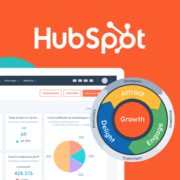Everything You Need to Know About HubSpot in 2025
Hubspot in 2025, businesses are more digitally connected than ever before. To stay competitive in this fast-paced environment, companies need smart, streamlined solutions that align marketing, sales, customer service, and operations—all in one place. That’s where HubSpot comes in.
Whether you’re a small startup or a growing enterprise, understanding what Hub Spot offers and how it can power your business strategy is crucial. In this article, we’ll break down everything you need to know about Hub Spot in 2025—its features, benefits, pricing, updates, and why it continues to be a market leader in customer relationship management (CRM) and inbound marketing.
What Is HubSpot?
HubSpot is a cloud-based CRM platform designed to help businesses attract, engage, and delight customers at every stage of the buyer’s journey. Founded in 2006, HubSpot has evolved into a powerful all-in-one solution offering tools for marketing automation, sales enablement, customer service, content management (CMS), and operations.
What makes HubSpot unique is its user-friendly interface, robust automation capabilities, and a modular “hub” system that allows companies to scale their tech stack as they grow.
HubSpot’s Core Hubs in 2025
As of 2025, HubSpot is structured around five core “Hubs”:
1. Marketing Hub
The HubSpot Marketing Hub helps you generate leads, nurture contacts, and convert them into customers. It includes:
- Email marketing automation
- SEO and content strategy tools
- Landing page and form builders
- Social media management
- Analytics and reporting
New in 2025: Advanced AI-driven campaign suggestions, predictive lead scoring, and hyper-personalized content creation powered by machine learning.
2. Sales Hub
The Sales Hub equips sales teams with the tools to close deals more efficiently. Features include:
- Email tracking and templates
- Automated workflows
- Deal pipeline management
- Sales analytics
- AI-powered prospecting tools
Sales teams in 2025 love intuitive dashboard and the new AI assistant that helps reps craft personalized outreach emails in seconds.
3. Service Hub
Delivering excellent customer service is easy with the HubSpot Service Hub, offering:
- Live chat and ticketing system
- Knowledge base creation
- Customer feedback surveys
- Automation for support processes
The 2025 update includes AI chatbots that provide smart routing and real-time FAQ support, reducing resolution times significantly.
4. CMS Hub
For businesses looking to manage content and websites, HubSpot CMS Hub provides:
- Drag-and-drop website builder
- Dynamic content personalization
- SEO recommendations
- Multi-language content support
- Web hosting and security
New AI-powered copywriting tools and A/B testing features make CMS Hub a favorite for marketers in 2025.
5. Operations Hub
The Operations Hub is designed to streamline business processes by:
- Syncing data across tools
- Creating custom workflows
- Automating data cleansing
- Offering integrations with over 1,000 apps
HubSpot’s 2025 updates to Operations Hub now include real-time data quality alerts and more advanced data visualization tools.
HubSpot’s AI & Automation Advancements in 2025
AI has transformed HubSpot in 2025. From intelligent campaign automation to predictive customer behavior analytics, HubSpot’s use of artificial intelligence helps businesses make faster, smarter decisions.
Some AI-powered features include:
- Smart Content that adapts to visitor behavior
- AI Lead Scoring for better sales prioritization
- Automated Reporting for instant campaign insights
- AI Chatbots that support customers 24/7
These updates make HubSpot one of the most powerful platforms for modern, data-driven marketing and sales teams.
Integrations and Ecosystem
Another major reason businesses choose is its open ecosystem. HubSpot integrates seamlessly with platforms like:
- Salesforce
- Slack
- Google Workspace
- Shopify
- Zoom
- Mailchimp
- WordPress
With its powerful API and App Marketplace, HubSpot enables businesses to connect all their tools in one central hub.
HubSpot Pricing in 2025
HubSpot offers flexible pricing models to fit different business sizes and needs:
- Free Tools: CRM, email marketing, forms, and more
- Starter Plans: Begin at around $50/month per hub
- Professional Plans: Range from $800–$1,600/month
- Enterprise Plans: Tailored for large organizations with advanced features
In 2025, HubSpot has also introduced bundled plans that allow companies to subscribe to multiple hubs at discounted rates.
Who Should Use HubSpot?
HubSpot is ideal for:
- Startups and small businesses that need an affordable, easy-to-use platform
- Marketing agencies managing multiple clients and campaigns
- B2B companies with long sales cycles needing robust lead nurturing
- Customer service teams looking for streamlined support processes
Whether you’re just starting out or scaling fast, HubSpot adapts to your business’s unique growth journey.
Final Thoughts: Why it Remains a Leader in 2025
In a crowded field of CRM and marketing platforms, HubSpot stands out in 2025 due to its seamless user experience, powerful automation, AI-driven innovation, and unmatched scalability. It’s not just a tool—it’s an ecosystem designed to grow with your business.
If you’re looking to streamline your operations, boost conversions, and deliver exceptional customer experiences, there’s no better time to explore Hub Spot.
Interested in trying HubSpot? Start with their free CRM and upgrade as your business grows. It’s one of the smartest moves a modern business can make in 2025.

